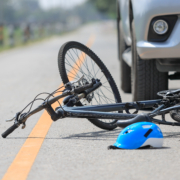How to Prove Negligence in a Personal Injury Case
If you’re pursuing a personal injury claim, a jury must be “reasonably satisfied” (more probable than not) by the evidence in order to rule in your favor. In Alabama, that vote must be unanimous. In order to settle your case, you will need to convince the insurance adjuster that a jury will most likely find it in your favor and that the amount you are demanding to settle for is in line with the insurance company’s analysis. Learn more about proving negligence and factors that may complicate your personal injury claim in Alabama.
Elements of Negligence
There are several elements that must exist for you to prove negligence. These include:
-
Duty of care:
The person you are claiming is liable for your accident must have had a duty of care to you. A duty of care is a person’s legal obligation to take reasonable measures to prevent causing injury to others.
-
Breach of duty:
You must also be able to show that the other party breached their duty of care. They did something that a reasonable person would not have done while trying to avoid hurting another person.
-
Causation:
The other party’s breach of duty must have a clear link to the accident in which you were injured, as well as the injuries you received.
-
Measurable damages:
The victim must have measurable damages for which they are seeking compensation. This is where some claims falter—it’s not enough that the other person did something wrong and that something bad could have happened. Their negligent choice must have led to actual harm.
Each type of claim is driven by its own facts. Imagine a dog bite. In this case, the defendant’s duty of care is to keep their dog contained while in public and ensure that they are leashed. They may breach that duty by letting their dog out off-leash or failing to close their fence gate knowing that their dog has a propensity to be aggressive and attack. That breach of duty causes the victim to be bitten, as the dog would not have been able to get to them had the owner been in control. The victim has some amount of measurable damages.
Important Evidence for Your Claim
There are many types of evidence that can strengthen your claim and help you prove negligence. Your attorneys may explore options like:
-
Documentation from the scene:
When you’re involved in an accident, taking photos and videos of the scene can be helpful. Your documentation may show any contributing factors, injuries, and property damage. If you can get access to surveillance footage from nearby homes or businesses, that may provide evidence from multiple angles.
-
Official reports and records:
Police records and documentation from the insurance company can be used to convince the insurance provider that its driver was at fault.
-
Eyewitness testimony:
Eyewitnesses are a valuable source of evidence in many personal injury claims. They offer an impartial perspective of what happened, and in many cases, they can even add context that you otherwise wouldn’t have.
-
Medical records:
Proof of your injuries is an important part of your personal injury claim. You should keep your medical bills, records, test results, appointment notes, and anything else you receive as part of your medical care.
Contributory Negligence in Alabama
One factor complicating Alabama claims is the concept of contributory negligence. In contributory negligence states, if the plaintiff is found even a little bit responsible for the accident that caused their injuries, they are barred from recovering compensation in court. This is a fairly harsh rule, which is why few states still use it.
Most states have comparative negligence or modified comparative negligence rules. These allow the victims to recover compensation if they are partially to blame; their court award is just decreased proportionately to their share of liability. In some states, they cannot get compensation if they are more than 50% to blame. Both of these options give victims a lot more flexibility.
In Alabama, an insurance company may have an upper hand if they know they can prove that the victim was even 1% liable for the accident. Your attorney will explain whether or not this is a concern for you. By gathering evidence, working with an attorney, and getting the proper medical care, you can give yourself a fair chance at compensation for your accident. Contact us for more information.













Leave a Reply
Want to join the discussion?Feel free to contribute!